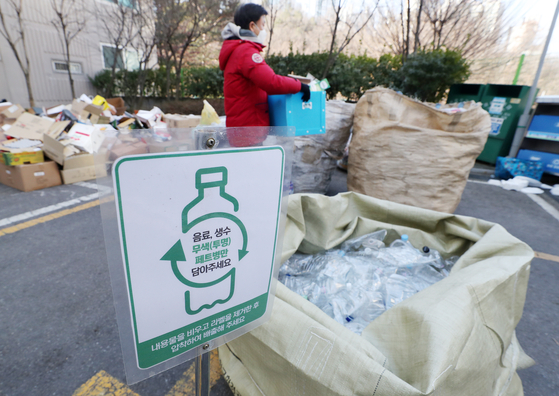![On the 5th of last month, a resident is throwing away plastic trash at an apartment collection center in downtown Seoul. [뉴스1]](https://i0.wp.com/pds.joins.com/news/component/htmlphoto_mmdata/202102/01/eadebdef-bebe-4763-ac39-736837d1602c.jpg?w=560&ssl=1)
On the 5th of last month, a resident is throwing away plastic trash at an apartment collection center in downtown Seoul. [뉴스1]
The domestic oil and chemical industry is devoted to eco-friendly business. It is a part of ESG (environmental, social, governance) management that is spreading around the world. The government has declared that it will zero actual carbon emissions by 2050. The US and the European Union (EU) announced the introduction of a carbon border tax, accelerating each country’s low-carbon policies. Accordingly, the industry’s movement to monetize eco-friendly businesses is accelerating.
According to the industry on the 1st, the field that has been focusing since the beginning of the year is the waste plastic recycling business. SK Global Chemical recently signed a memorandum of understanding (MOU) with US Brightmark for commercialization of waste plastic pyrolysis oil. Brightmark, a renewable fuel producer, has the technology to manufacture pyrolysis oil that breaks down waste plastics into naphtha (naphtha), a raw material for petrochemical products. SK plans to work with this company to come up with plans for investment in pyrolysis facilities by the first half of this year.
GS Caltex signed an MOU with AMOREPACIFIC on the 27th of last month to recycle plastic empty bottles. The plan is to recycle 100 tons of plastic empty bottles of AMOREPACIFIC every year to make eco-friendly composite resins. Composite resin is a functional plastic used as a raw material for cosmetic containers, automobile parts, and home appliance parts. Among the domestic refineries, only GS Caltex is produced. A GS Caltex official said, “63% of cosmetic bottles are plastic,” and “We plan to make half of AMOREPACIFIC’s product containers with eco-friendly composite resins by 2025.”
Clothing is also produced from waste PET bottles
![Hyosung TNC and North Face decided to produce jackets and T-shirts by making recycled fibers from PET bottles collected in Jeju. [사진 효성]](https://i0.wp.com/pds.joins.com/news/component/htmlphoto_mmdata/202102/01/69060902-bd94-40d8-87a9-af9f0024d124.jpg?w=560&ssl=1)
Hyosung TNC and North Face decided to produce jackets and T-shirts by making recycled fibers from PET bottles collected in Jeju. [사진 효성]
Waste PET bottles are being recycled as clothes and bags. In December of last year, Lotte Chemical created eco-friendly bags and sneakers with LAR, an eco-friendly product manufacturer. They collaborated with PET bottles collected by Kumho Textile Industries as raw materials, and the Korea Textile Development Institute made and supplied yarns and fabrics. During the first half of this year, it decided to produce clothes and pouches with startups such as Beyond and Revelop.
Hyosung TNC signed an MOU with Jeju-do and Seoul City to produce eco-friendly fibers from waste PET bottles one after another. The fiber made from PET bottles collected in Jeju was named’Regen Jeju’. Until the end of the year, it is made into products such as jackets and t-shirts through North Face. Regen Seoul, a recycled fiber made from transparent PET bottles collected in Gangnam, Geumcheon, and Yeongdeungpo, Seoul, will be transformed into eco-friendly bags and clothing through Plitzmama.
The rotting plastic development craze
![LG Chem Vice Chairman Shin Hak-cheol announced LG Chem's strategy of '2050 carbon-neutral growth' at'Davos Agenda Week' held online on the 27th of last month. [사진 LG화학]](https://i0.wp.com/pds.joins.com/news/component/htmlphoto_mmdata/202102/01/1a2f4a10-f660-4b93-ae7c-8c37cf5243a8.jpg?w=560&ssl=1)
LG Chem Vice Chairman Shin Hak-cheol announced LG Chem’s strategy of ‘2050 carbon-neutral growth’ at’Davos Agenda Week’ held online on the 27th of last month. [사진 LG화학]
Some companies are striving to develop rotting plastic and vinyl. LG Chem developed the world’s first 100% biodegradable plastic last year. It is made from glucose and glycerol extracted from corn, but has similar durability to ordinary plastic made from petroleum.
SKC, which developed the world’s first eco-friendly biodegradable film in 2009, is expanding its applied products to food packaging, clothing, and book packaging. The material that strengthens the strength of existing biodegradable plastics using wood pulp extract is also aiming to commercialize within this year.
Eco-friendly businesses in the oil and chemical industries are also essential to secure the market. The EU announced that it will establish a new carbon border tax in 2023 and the United States in 2025. It is predicted that these industries will suffer the most damage. Jeong Hong-seok, a researcher at KDB Future Strategy Research Institute, said, “The demand for refined oil and chemical products is greatly decreasing due to the strengthening of the global low-carbon policy.
Reporter Kim Kyung-mi [email protected]
